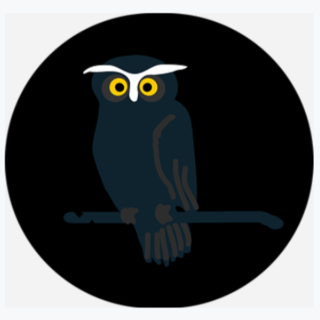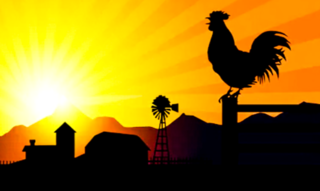Sleep
Cracking the Genetic Code of People Who Need Less Sleep
Natural short sleepers—who thrive on very little shut-eye—may share a rare gene.
Posted September 2, 2019

Night owls get a bad rap. In modern culture, any night person—who also naturally needs at least eight hours of sleep to function well the next day—is likely to be looked down on as a slacker who lacks a robust, puritan work ethic.
All too often, someone with a natural sleep-wake cycle that doesn't conform with post-industrial norms or fit the mainstream work-a-day world, "Rise and Shine!" at dawn priority structure is labeled, judged, and stigmatized for not being "up and at 'em" early enough.
"Nothing good ever happens after midnight!" is a timeless maxim that some say dates back to stories of Solomon warning his son about adultery in the Bible. This adage puts "early-to-bed and early-to-rise" habits on a higher moral ground than being a nighthawk. The saying also reinforces the idea that "good" people go to bed early.
While writing this piece, I wanted some neutral synonyms for "night owl." Suffice to say, I had a LOL moment when I saw that Thesaurus.com only equates "night owl" with "as in dissolute" or "as in Playboy." Their laundry list of synonyms for "night owl" all have negative connotations: "Corrupt, debaucherous, degenerate, depraved, evil, fast and loose, lewd, lax, slack, unprincipled, wanton, wayward, and wild."
Despite the negative associations with being a night owl, there are obviously countless examples of legendary creative greats and prolific writers (e.g., J.R.R. Tolkein, Bob Dylan, Carl Jung) and very successful people who are notorious for doing their best thinking and writing late at night.
However, on the flip side, some people (like myself) can only flourish on a very-early-to-bed, very-early-to rise routine and have trouble staying up past 10 p.m. (seven days a week).
Over the past few weeks, I've been thinking a lot about the genetic and familial aspects of sleep-wake cycles. Everyone in my family has a quirky chronobiology. I take after my father and grandfather, who both tended to wake up every morning around 4 a.m. and would usually conk out by 9 p.m., even on weekends.
That said, other members of my family do their best thinking in the wee hours and prefer to work the night shift. For example, my older sister has written a few scholarly books while burning the midnight oil. And my younger sister is a FedEx pilot who captains Boeing 777 airplanes on round-the-world flights that usually depart when everyone else in that time zone is sleeping.
One reason my younger sibling took a job with FedEx is because of her chronobiology; she prefers flying all-night-long and has trouble functioning on a traditional 9-to-5 circadian work cycle. As a female Captain, she breaks stereotypes and is one of the most regimented people I know. She's also the antithesis of all the ridiculously negative synonyms associated with being a "night owl" listed above.

Technically, as an extreme early bird who naturally dozes off around 8 p.m. and rises in the predawn hours, I'm what sleep experts such as Louis Ptáček and Ying-Hui Fu of the University of California, San Francisco (UCSF) classify as having "advanced sleep phase" or ASP.
Some sleep experts refer to those of us who are genetically wired to fall asleep really early as having ASPD—with the "D" standing for "Disorder."
However, in a recent Q&A I had with Ptáček, he clarified that his team doesn't consider ASP a disorder unless the individual dislikes rising before daybreak, misses out on nighttime social activities, and considers being an "extreme morning chronotype" an undesirable trait.
Our Q&A was inspired by another recent study (Curtis et al., 2019) that was also senior co-authored by Ptáček & Fu. This paper was published on August 6 in the journal SLEEP and reported that about one in 300 people has a genetic predisposition for ASP. Statistically, in the scientific world, a 1/300 ratio means that ASP is "not exceedingly rare."
In my August 21 Q&A with Ptáček, he also pointed out that there appears to be a genetically driven variation in how much sleep each person in the general population needs every night. The two extremes in a continuum are described as "natural short sleepers" (NSS), who generally need less than the typical 8-hours of nightly sleep, and "natural long sleepers" (NLS), who need more sleep than the average person.
Although natural long sleepers may be stigmatized and called "lazy" by some onlookers, Ptáček emphatically stated that nobody should be judged based on where they fall on the spectrum between NSS and NLS.
In describing how his team at UCSF classifies various chronotypes, Ptáček pointed out that they purposefully avoid terms with negative connotations. He said, "[We] do not make any value judgments about chronotype. We should not discriminate against people because of skin color or sex or age or religion—and we should also not discriminate on the basis of chronotype!"
During our Q&A, Ptáček gave me a heads-up that he and his longtime colleague at UCSF, Ying-Hui Fu, had some new research about human sleep genes linked to "NSS" in the pipeline that would be published soon.
Last week, a news release from UCSF announced this exciting breakthrough in an article, "After 10-Year Search, Scientists Find Second 'Short Sleep' Gene." As Jason Alvarez reported:
"Natural short sleepers remained a mystery until 2009 when a study conducted by Fu's team discovered that people who had inherited a particular mutation in a gene called DEC2 averaged only 6.25 hours of sleep per night; study participants lacking the mutation averaged 8.06 hours.
After a decade of searching, the UCSF scientists [Ptáček & Fu] who identified the only human gene known to promote natural short sleep—lifelong, nightly sleep that lasts just four to six hours yet leaves individuals feeling fully rested—have discovered a second.
As the new study describes, a breakthrough came when the researchers identified a family that included three successive generations of natural short sleepers, none of whom harbored the DEC2 mutation.
The researchers used gene sequencing and a technique known as linkage analysis, which helps scientists pinpoint the exact chromosomal location of mutations associated with a particular trait, to comb through the family's genome. Their efforts uncovered a single-letter mutation in a gene known as ADRB1 that, like the mutation in DEC2, was associated with natural short sleep."
This study (Shi et al., 2019) was co-senior authored by Louis Ptáček and Ying-Hui Fu of the UCSF Weill Institute for Neurosciences and published August 28 in the journal Neuron.
"Today, most people are chronically sleep-deprived. If you need eight to nine hours, but only sleep seven, you're sleep-deprived," Fu said in a statement. "This has well-known, long-term health consequences. You're more likely to suffer from cardiovascular disease, cancer, dementia, metabolic problems, and a weakened immune system."
Interestingly, although natural short sleepers only sleep about four to six hours a night, they do not appear to suffer adverse side effects typically associated with sleep deprivation. In fact, most natural short sleepers appear to benefit from their quirky chronobiology.
According to Fu, her research team found that short sleepers tend to be more optimistic and energetic. They also appear to have higher pain thresholds than the general population and bounce back from jet lag more quickly.
The exact reason that having a genetic disposition for NSS may be associated with a wide range of benefits remains a mystery; identifying specific "natural short sleep" genes is just a first step.
"It's remarkable that we know so little about sleep, given that the average person spends a third of their lives doing it," Ptáček said in a statement. "This research is an exciting new frontier that allows us to dissect the complexity of circuits in the brain and the different types of neurons that contribute to sleep and wakefulness. Sleep is complicated. We don't think there's one gene or one region of the brain that's telling our bodies to sleep or wake. This is only one of many parts."
Fu and Ptáček believe that their research on genetic and familial links to ASP, NSS, and NLS represents a crucial step towards better understanding the connection between getting a good night's sleep and staying healthy.
Related Posts:
References
Guangsen Shi, Lijuan Xing, David Wu, Bula J. Bhattacharyya, Christopher R. Jones, Thomas McMahon, S.Y. Christin Chong, Jason A. Chen, Giovanni Coppola, Daniel Geschwind, Andrew Krystal, Louis J. Ptáček, Ying-Hui Fu. "A Rare Mutation of β1-Adrenergic Receptor Affects Sleep/Wake Behaviors." Neuron (First published: August 28, 2019) DOI: 10.1016/j.neuron.2019.07.026
Brian John Curtis, Liza H Ashbrook, Terry Young, Laurel A Finn, Ying-Hui Fu, Louis J Ptáček, Christopher R Jones. "Extreme Morning Chronotypes Are Often Familial and Not Exceedingly Rare: The Estimated Prevalence of Advanced Sleep Phase, Familial Advanced Sleep Phase, and Advanced Sleep–Wake Phase Disorder in a Sleep Clinic Population." Sleep (First published: August 6, 2019) DOI: 10.1093/sleep/zsz148
References from Louis Ptáček Q&A Correspondence:
1. Toh KL, Jones CR, He Y, Eide EJ, Hinz WA, Virshup DM, Ptáček LJ, Fu YH. An hPer2 phosphorylation site mutation in familial advanced sleep-phase syndrome. Science. 2001; 291:1040-3. DOI: 10.1126/science.1057499
2. Xu Y, Padiath QS, Shapiro RE, Jones CR, Wu SC, Saigoh N, Saigoh K, Ptáček LJ, Fu YH. Functional consequences of a CKIδ mutation causing familial advanced sleep phase syndrome. Nature. 2005; 434:640-4. DOI: 10.1038/nature03453
3. Xu Y, Toh KL, Jones CR, Shin JY, Fu YH, Ptáček LJ. Modeling of a human circadian mutation yields insights into clock regulation by PER2. Cell. 2007 Jan 12; 128(1):59-70. DOI: 10.1016/j.cell.2006.11.043
4. Brennan KC, Bates EA, Shapiro RE, Zyuzin J, Hallows WC, Huang Y, Lee H-Y, Jones CR, Fu Y-H, Charles AC, Ptáček LJ. Casein kinase Iδ mutations in familial migraine and advanced sleep phase. Science Translational Medicine. 2013 May 1;5(183):183ra56. DOI: 10.1126/scitranslmed.3005784
5. Zhang L, Hirano A, Hsu P-K, Jones CR, Sakai N, Okuro M, McMahon T, Yamazaki M, Xu Y, Saigoh N, Saigoh K, Lin S-T, Kaasik K, Nishino S, Ptáček LJ, Fu Y-H. A PERIOD3 Variant Causes a Circadian Phenotype and is Associated with a Seasonal Mood Trait. Proc Natl Acad Sci U S A. 2016 Feb 22. pii: 201600039. DOI: 10.1073/pnas.1600039113
6. Hirano A, Shi G, Jones CR, Lipzen A, Pennacchio LA, Xu Y, Hallows WC, McMahon T, Yamazaki M, Ptáček LJ, Fu Y-H. A novel Human Cryptochrome 2 variant yields Familial Advanced Sleep Phase. eLife. 2016 Aug 16;5. pii: e16695. DOI: 10.7554/eLife.16695
7. Hirano A, Fu Y-H, Ptáček LJ. FAD regulates CRYPTOCHROME protein stability and circadian clock in mice. Cell Reports 2017, 19:255–266. DOI: 10.1016/j.celrep.2017.03.041
8. Kurien P, Hsu P-K, Leon J, Wu D, McMahon T, Shi G, Xu Y, Lipzen A, Pennacchio LA, Jones CR, Fu Y-H, Ptáček LJ. A TIMELESS mutation alters phase responsiveness and causes advanced sleep phase. Proc Natl Acad Sci U S A. 2019 May 28. pii: 201819110. DOI: 10.1073/pnas.1819110116. PMID: 31138685
9. He Y, Jones CR, Fujiki N, Xu Y, Guo B, Holder J, Nishino S, and Fu Y-H. The transcriptional repressor DEC2 regulates sleep length in mammals. Science 2009; 325:866 DOI: 10.1126/science.1174443




